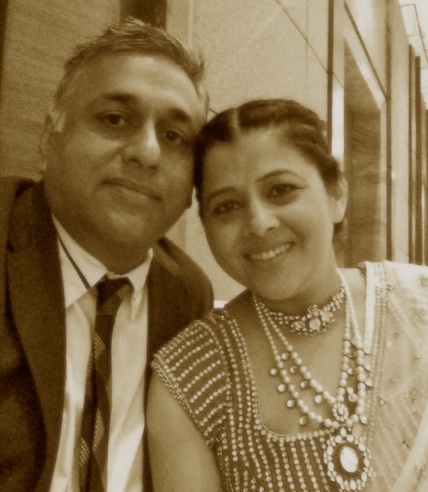Om Swami's Blog, page 14
September 20, 2019
The Heart of Success

In Indian villages, even today, when an elephant passes through a village, all the elders gather and fold their hands in reverence. They also nudge the children to do the same and bow to the majestic pachyderm. “This is Lord Ganesha,” they say. And the kids quickly bring their hands together in reverence and holler, “Ganapati Bappa Morya!” and so on. The women step out of their homes to offer sweetmeats, lentils, flour, fruits and veggies to the mahout. Some feed the elephant bananas and sugarcane.
While this procession is on the move, a fascinating, though unsettling, thing happens: all the stray dogs of the village, puppies included, start following the elephant, barking and growling relentlessly.
What problem could the dogs possibly have with the elephant? It’s not like they are a match in any way. What competition could the hounds and pooches pose to the mighty tusker?
I’m sure if someone could ask the dogs the reason for their incessant barking, they would answer, “We have no problem with the elephant per se. It’s these people folding hands and offering all that food to the elephant that bothers us.”
But, the dogs don’t have the nerve to jump in front of the elephant or block his way. They will never come in front and will never stop barking from the back.
And so is the way of the world—the more the number of those who look up to you and stand in front with gifts, the greater the number of those who will bark behind you.
The elephant, however, never stops to shoo away the dogs or to tackle them. It keeps on walking, indifferent to the uncouth and clownish behavior of the dogs. But what makes the elephant truly unique and masterful is not just that it doesn’t stop for the dogs. It’s something more profound.
If the elephant doesn’t stop for the dogs, it doesn’t halt for the ones bowing in reverence either.
It remains unmoved by both the glory and the growls. Our true self is beyond praise and criticism, it is beyond disease, death and decay. It shines in its own splendor. (Though a common analogy, someone had shared this story with me from a discourse by Swami Rajeshwaranand.)
The emotions we experience when showered with praises or hit with criticism are temporary feelings that mostly arise when we forget how incredibly empowered and powerful we truly are.
The path of success is littered with opinions and suggestions. Everyone you meet will have some kind of an opinion and you are likely to cross paths with many who won’t believe in you. They will give you a million reasons why you will fail. It’s alright, that’s all they know. You’ll also meet some who may offer you false praise, just to attain a desired outcome. It’s the way of the material world. Then you’ll also meet some who are genuine and will influence your life in a phenomenal way.
Like the elephant, if you can keep your head on your shoulders and remain unmoved by such people and have faith in your own conviction as well as the wisdom to know when and how much to listen to someone, success is yours for the taking.
When I sat down to write this book, in fact, I should say when I stood up to write this book (because I do all my writing while walking on a treadmill desk), there was no confusion in my mind as to what I wished to say. I felt there was no need for me to reinvent the wheel. Wiser words by more brilliant people have been written before me and the same will continue after me. But, what if we could take some cues from our Vedic wisdom and approach success as a journey and not an attainment. I felt we would end up with powerful principles and insights that anyone could use in their daily life.
An understanding of the self—that you are not a product of the opinions of others but of your own thoughts, feelings and actions—is critical to attaining supreme success in any endeavor you wish to undertake.
Who, what and how you are is infinitely more important than how you plan to embark on your journey of success.
The S in Self represents the S of the Sacred Principle. But, this S could also mean many other things. Sale, for example. Just as a person cannot exist without a self, no business can survive without a profitable sale…
This was an excerpt from my latest book, The Heart of Success, published by Jaico Publishing. It was on my mind to share with you the first chapter but it’s already available on Amazon, so I shared the third chapter instead. In this book, I introduce you to the Sacred principle of success, as I call it. Where S in Sacred stands for Self in a spiritual context or Sale in the business world. And, ACRED stands for, wait a minute, it’s an anagram of CARED and it contains READ. So, if you care to read it, you’ll know what it stands for. Better be quick because more reading material coming for you in November!
Available in both Kindle and paperback, here are the links:
Amazon IndiaAmazon.com
Peace.
Swami
14 Awesome and inspiring books (print and Kindle)
[new!] The Children of Tomorrow :: Buy on: amazon.in | amazon.com
The Hidden Power of Gayatri Mantra :: Buy on: amazon.in | amazon.com
The Book of Faith :: Buy on: amazon.in | amazon.com
Mind Full to Mindful :: Buy on: amazon.in | amazon.com
A Fistful of Wisdom :: Buy on: amazon.in | amazon.com
The Ancient Science of Mantras :: Buy on: amazon.in | amazon.com
The Last Gambit :: Buy on: Flipkart | amazon.in | amazon.com
A Million Thoughts: Learn All About Meditation :: Buy on: Flipkart | amazon.in | amazon.com
Om Swami: As We Know Him :: Buy on: Flipkart | amazon.in | amazon.com
Kundalini — An Untold Story :: Buy on: Flipkart | amazon.in | amazon.com
When All is Not Well :: Buy on: Flipkart | amazon.in | amazon.com
If Truth Be Told :: Buy on: Flipkart | amazon.in | amazon.com
The Wellness Sense :: Buy on: Flipkart | amazon.in | amazon.com
A Fistful Of Love :: Buy on: Flipkart | amazon.in | amazon.com
September 6, 2019
Stories We Tell
 What do you do if someone asks you why are you sad? Usually, you will tell them a story behind your sadness. That, so-and-so did or didn’t do something for me, or that such-and-such person said xyz to me, or ... Read more →
What do you do if someone asks you why are you sad? Usually, you will tell them a story behind your sadness. That, so-and-so did or didn’t do something for me, or that such-and-such person said xyz to me, or ... Read more →
August 16, 2019
Realizing Your Potential
 In Tales of the Hasidim, Martin Buber tells the story of a Jewish master, Rabbi Zusya. The rabbi had led a life of extraordinary devotion and certitude, and yet, when he was dying, he cried inconsolably. This behavior of Zusya ... Read more →
In Tales of the Hasidim, Martin Buber tells the story of a Jewish master, Rabbi Zusya. The rabbi had led a life of extraordinary devotion and certitude, and yet, when he was dying, he cried inconsolably. This behavior of Zusya ... Read more →
Realizing Your Potential

In Tales of the Hasidim, Martin Buber tells the story of a Jewish master, Rabbi Zusya. The rabbi had led a life of extraordinary devotion and certitude, and yet, when he was dying, he cried inconsolably. This behavior of Zusya completely baffled his students who were present in the same room at the time. They tried to pacify him by saying all kinds of positive things, but Rabbi Zusya wouldn’t stop shedding tears.
“Take heart, Rebbe,” the students spoke, “you lived an exemplary life. You have been as wise as Moses and as kind as Abraham, so you will be judged positively in heaven.”
“When I go to heaven,” Zusya said, “I will not be asked why weren’t you like Moses, or why weren’t you like Abraham. They will ask, why weren’t you like Zusya?” Why didn’t you fully live up to your own potential?”
That’s all what really counts at the end of the day. That is: have I lived up to my potential? Doing so is not possible though unless I discover my own truth, not my teacher’s or my ideal’s, but my own. And the courage to charter my own course requires self-belief and conviction, neither of which comes unless I’m at peace with myself and my decisions.
I have also realized that to be at peace requires a degree of self-esteem. You must have a certain level of acceptance and love for yourself before you can be at peace with who, where, and what you are, figuratively and materially. And, it’s not possible to love or respect yourself unless you are at ease, unless you live with a sort of carefree abandon. Often when someone asks us who we are, our first response is to start narrating our CV, that I’m a graduate from such-and-such university or that I work for so-and-so or that I am the CEO etc. We rarely say what we stand for. We don’t usually say, I’m a kind person, a truthful or an honest person. Instead, we start telling what we do. Such a mindset distances us from the gifts we are born with. We lose track of why we are here or what we can do with our lives.
Most of us are forever trying to be like someone else. Inspiration is good, imitation, not so. is catastrophic. As they say, a true measure of progress is not how well we perform in comparison to others, but how we are doing compared to our own past. As long as comparison inspires us, it is perhaps still healthy but we are on a perilous road when such comparison makes us feel inadequate.
Parker J. Palmer in Let Your Life Speak pens down a beautiful passage. I read this book over five years ago, but for some reason the memory and the gist of his message has stayed with me. I quote.
Watching my granddaughter from her earliest days on earth, I was able, in my early fifties, to see something that had eluded me as a twenty-something parent: my granddaughter arrived in the world as this kind of person rather than that, or that, or that.
She did not show up as raw material to be shaped into whatever image the world might want her to take. She arrived with her own gifted form, with the shape of her own sacred soul. Biblical faith calls it the image of God in which we are all created… The humanist tradition calls it identity and integrity. No matter what you call it, it is a pearl of great price.
In those early days of my granddaughter’s life, I began observing the inclinations and proclivities that were planted in her at birth. I noticed, and I still notice, what she likes and dislikes, what she is drawn toward and repelled by, how she moves, what she does, what she says.
I am gathering my observations in a letter. When my granddaughter reaches her late teens or early twenties, I will make sure that my letter finds its way to her, with a preface something like this: “Here is a sketch of who you were from your earliest days in this world. It is not a definitive picture—only you can draw that. But it was sketched by a person who loves you very much. Perhaps those notes will help you do sooner something your grandfather did only later: remember who you were when you first arrived and reclaim the gift of true self.”
We arrive in this world with birthright gifts—then we spend the first half of our lives abandoning them or letting others disabuse us of them. As young people, we are surrounded by expectations that may have little to do with who we really are, expectations held by people who are not trying to discern our selfhood but to fit us into slots… We are disabused of original giftedness in the first half of our lives. Then – if we are awake, aware, and able to admit our loss – we spend the second half trying to recover and reclaim the gift we once possessed.
On the battlefield of Kurukshetra, confused about what he ought to do, Arjuna too had lost his way. He no longer wanted to be a warrior or fight for the cause that mattered. He was ready to give up. Krishna gave a similar advice to Arjuna.
shreyan sva-dharmo vigunah para-dharmat sv-anushthitat,
svabhava-niyatam karma kurvan napnoti kilbisham.
IAST: śhreyān swa-dharmo viguṇaḥ para-dharmāt sv-anuṣhṭhitāt
svabhāva-niyataṁ karma kurvan nāpnoti kilbiṣham. (Bhagavad Gita, 18.47)
You can't give up what comes to you naturally and copy someone else, it's not worth it. There's no conflict nor confusion when you align your talents with your action.
In my humble opinion, if you choose to not utilize your skills, or make a decision to operate at a level much lower than what you are capable of, you won’t experience lasting happiness. Even if we despise it, nature takes work from us according to our mindset, potential, and our stream of consciousness. We may as well then align ourselves for boundless creativity and joy.
Mulla Nasrudin was showing around the newly built university to the chief guest, a local minister, when they stopped by the library with a large inscription that read, The Al Habib Hall of Wisdom.
“Who’s Al Habib?” the minister asked curiously. “Never heard of him!”
“Why, sir,” Mulla said, “he was a great author.”
“Really? What did he write?”
“A cheque.”
The world will not remember us for what we kept to ourselves but what we gave away. We will not be honored for what we could have done but what we did. We are not respected for our potential but action. We are not valued for the intentions we have but the outcome we deliver. We don’t feel good for what we can do but for what we actually do. If that’s the case, which it is, we may as well reclaim our gifts and do our best. At least, we’ve got to try. Why just aim for the moon when you can land on it.
Peace.
Swami
14 Awesome and inspiring books (print and Kindle)
[new!] The Children of Tomorrow :: Buy on: amazon.in | amazon.com
The Hidden Power of Gayatri Mantra :: Buy on: amazon.in | amazon.com
The Book of Faith :: Buy on: amazon.in | amazon.com
Mind Full to Mindful :: Buy on: amazon.in | amazon.com
A Fistful of Wisdom :: Buy on: amazon.in | amazon.com
The Ancient Science of Mantras :: Buy on: amazon.in | amazon.com
The Last Gambit :: Buy on: Flipkart | amazon.in | amazon.com
A Million Thoughts: Learn All About Meditation :: Buy on: Flipkart | amazon.in | amazon.com
Om Swami: As We Know Him :: Buy on: Flipkart | amazon.in | amazon.com
Kundalini — An Untold Story :: Buy on: Flipkart | amazon.in | amazon.com
When All is Not Well :: Buy on: Flipkart | amazon.in | amazon.com
If Truth Be Told :: Buy on: Flipkart | amazon.in | amazon.com
The Wellness Sense :: Buy on: Flipkart | amazon.in | amazon.com
A Fistful Of Love :: Buy on: Flipkart | amazon.in | amazon.com
August 3, 2019
The Last Letter
 In any given year, on an average, I skim over 10,000 emails, and 3,000+ notes and letters sent to me physically during various events (still better than three times as many emails until 2014). This does not include hundreds of ... Read more →
In any given year, on an average, I skim over 10,000 emails, and 3,000+ notes and letters sent to me physically during various events (still better than three times as many emails until 2014). This does not include hundreds of ... Read more →
August 2, 2019
The Last Letter

In any given year, on an average, I skim over 10,000 emails, and 3,000+ notes and letters sent to me physically during various events (still better than three times as many emails until 2014). This does not include hundreds of group and personal meetings, and just as many questions I read and answer in Swaminars. Plus, there’s my work. Black Lotus, blog, ashram, writing, editors, publishers, travel, events, and so on. In other words, a large part of my time goes in interacting with people. Even with the constant barrage of emails and issues that demand my attention, somehow, her note had caught my eye.
She first wrote to my admin team four years ago and I agreed to meet her instantly. She was not in a position to travel to the ashram, so we made arrangements to see her during one of my stopovers.
A frail, beautiful soul, Vandana, Vandana Sharma, just over forty summers old, had both a bit of fear and hope in her eyes when I met her three years ago. She had been fighting cancer since 2015. It was at an advanced stage and had metastasized already. She wanted to be well again and live, she told me in no uncertain terms and Vandana was deeply worried about her young children. Never-ending treatments in the form of surgeries, medication, chemo, and radiation had wreaked havoc on her wellbeing. At times, she had no energy to walk and they brought her to me in a wheelchair. She would always be just as smiling and nervous as any other time.
She had come to me with a lot of faith, but how could I promise her something that was no longer in my hands? Could I? Did I? No.

And yet, I continued to see Vandana with her family and her ever-loving husband by her side. Whenever I could manage, I set aside a few minutes to see her and I must have met her five times or so. She sensed early on that I was unable to grant her wish.
I knew I could not do anything to help her stay on a bit longer on this planet. She had been handed an eviction notice by Mother Nature. Perhaps, a truer way to say it would be that she was being transferred. She had served her time here and I could not get her an extension.
Then, on Guru Poornima (16-Jul-2019), her husband visited me. Like every other time, he had handmade laddoos for me. Two boxes. One small one I kept and the other I blessed and returned. This had been our tradition from the very first meeting. We both knew that I didn’t really consume sweets but it was immaterial.
He gave me an envelope, and said, “Vandana wanted you to have this letter. I discovered it after her passing.”

I waited until the event was over because I wanted to read it in peace. It sat on my table for three days, in plain sight, reminding me that I had to give it the time and attention it deserved.
I share with you literatim (with the consent and permission of her husband). I have retained the paragraphing, punctuation and syntax exactly the way Vandana (17. 05. 1974 – 06. 05. 2019) wrote.
Swamiji
Shat-shat Pranam.If you are reading this then we both know what that means.
No problem!I’m so grateful to almighty for bringing you in my life at the time when I needed a guru to get me through the last and most difficult phase of my life. I’m going with a calm and peaceful heart and mind.
I’m sad but not scared. Sad because of the emotional attachments but not scared of what is to come. This evolution is only because of you.
I don’t know if I have changed but I feel and think differently now. I’m in immense pain but still I’m not angry with my circumstances, life or God. I’ve realised that I’m the creator of all my sufferings. All I have is deep love for every person I ever met. They are all me.
There was a time when I had energy and life but no idea what to do with it and now when I’ve gained a pinch of wisdom, there is no energy or life left. I wish I could get a chance to put it to good use with the right intent. That’s my only regret.
I used to worry a lot about my kids and especially [my husband] << name redacted >>. He is my soulmate and his world revolves around me but I’m not worried anymore because I know you are there to take care of all of them.
I used to wonder that if god had to give me life till now only then why not just take me through in a second with a stroke or accident! Why put me through this torture for more than 4 years? Now I understand the complete overhauling my soul has undergone to emerge more evolved.
It’s a small price I paid.I have a small request.
In all my lifetimes henceforth no matter what life form or vessel I will take on, just keep me around you in some or the other way. I don’t know how much my soul has wandered in search of your grace but now that I’ve found you I want to be just under its blessings. I know all my relations and attachments will keep changing in each lifetime but this one connect I want to continue till eternity. Promise me you will keep me around you always in every life time.With a very certain belief that we will meet very soon I’m saying goodbye to you.
You are my guru, my love, my god.
Thank you for all your unconditional love and support.
I might not recognise you but I’m sure you will find me.Jai Shri Hari
Vandana
Tathastu, I say.
The letter itself is the message I have for you today. Please know that one day it’s going to come to an end. Live your life like you love it and care for it. Petty thoughts, emotions, grudges, resentment, negativity, we really don’t have the time for all this. And, if you think you do, think again.
Make up or move on.
And yes, Vandana, Om Swami will find you. Like I’ve kept my word to the ones I’ve found (ongoing) this time around, Swami will find you. It’s my job, my dharma, neither of which I take for granted.
Peace.
Swami
14 Awesome and inspiring books (print and Kindle)
[new!] The Children of Tomorrow :: Buy on: amazon.in | amazon.com
The Hidden Power of Gayatri Mantra :: Buy on: amazon.in | amazon.com
The Book of Faith :: Buy on: amazon.in | amazon.com
Mind Full to Mindful :: Buy on: amazon.in | amazon.com
A Fistful of Wisdom :: Buy on: amazon.in | amazon.com
The Ancient Science of Mantras :: Buy on: amazon.in | amazon.com
The Last Gambit :: Buy on: Flipkart | amazon.in | amazon.com
A Million Thoughts: Learn All About Meditation :: Buy on: Flipkart | amazon.in | amazon.com
Om Swami: As We Know Him :: Buy on: Flipkart | amazon.in | amazon.com
Kundalini — An Untold Story :: Buy on: Flipkart | amazon.in | amazon.com
When All is Not Well :: Buy on: Flipkart | amazon.in | amazon.com
If Truth Be Told :: Buy on: Flipkart | amazon.in | amazon.com
The Wellness Sense :: Buy on: Flipkart | amazon.in | amazon.com
A Fistful Of Love :: Buy on: Flipkart | amazon.in | amazon.com
July 19, 2019
The Balloon Principle

Last week we had an amazing Black Lotus Champions’ orientation event. The energy in the hall was eclectic in this by-invitation-only program. It was heartwarming to see so many people committed to spreading kindness in the world. I have no doubt, based on experience and observation, that practicing kindness not only has a profound effect on our society but it can completely alter the course of your life too. Simply put, it’s the shortest route to happiness. No matter how dark the situation, one leap of kindness and you find yourself in a bright place.
One question, however, I am often asked is how to use kindness in the context of an organization? Most of you go to work, some of you are in charge of teams and divisions, even whole companies, how do you go about the business of kindness? Let me share with you a story I read many years ago. (And what an amazing thing the human mind is. Ask the right questions and it can help you solve the most difficult problems. Our minds are designed to churn out solutions. Five minutes ago, I didn’t know what I was going to write about but the moment I got down to scribble, it popped in my head. Ah, from popping, let me take you to the story of balloons.)
A major organization was struggling with a lack of trust and coordination among its disparate teams across the board. The culture of the company had become such that there was not only a persistent feeling of negativity but the teams engaged in unhealthy internal politics and competition too that bordered on employees undermining each other. The belief was set that you had to protect yourself at any cost.
A master strategist was called in as the guest speaker to spend a day with the heads of various divisions and to ascertain if perhaps the organization needed reframing. More than fifty senior managers showed up for the workshop.
“I’m handing you a balloon and a marker each,” the strategist said and pointed towards an empty room. “Your job is to inflate the balloon, write your full name on it and leave it in that vacant room. We’ll use a stopwatch to record your timing.”
Soon everyone was busy blowing air into balloons, tying the knots and writing their names. Some balloons burst in the process and the participants took extra time to complete the job. Once all the balloons were in, the speaker assigned them the next task of going back into the room, one-by-one, and finding their balloon. Once again, under the stopwatch.
Some participants were lucky to find theirs within a minute or two, but most took much longer. The strategist then stopped the exercise midway and instructed them to put their balloons back in the room once more.
“Do you think there’s a smarter way of finding these balloons?”
Some suggested that the balloons could be color-coded in four or five colors, representing different divisions and then the person would only have to sift through ten or fewer. Other managers suggested they could allocate more rooms for better segregation, hence making it easier to find them. These were plausible options.
“How about we change the rules a bit?” the speaker said. “Now, please go in the room, one by one, pick any balloon that you can get your hands on, announce the name written on the balloon and give it to the person who steps forward.”
A mere five minutes later, everyone had the right balloon in their hands.
“This is what collaboration does,” the strategist said. “Each balloon marked with your name represents your area of accountability (or a problem area) but by better communication, and collective kindness, you can help each other deliver against your objectives faster and better. Having more rooms or segregating the balloons, though commendable, would require additional resources.”
“What about the stopwatch?” one of the attendees asked.
“That was just to create the impression of urgency when there was none. A lot of the times, managers and team members create undue and negative stress around deliverables. Working with and for each other is more productive than working against.”
My own experience in engaging with some of the brightest minds and having the privilege of leading them on multiple occasions across various projects, companies, and industries has been quite similar too. That is, competent people are very driven and they tend to focus on finding the balloon marked with their name. After all, that’s how we have been conditioned: win at any cost. But true leaders know better. They know that creating massively successful giant organizations requires intelligent minds to work together. Such leaders go to great lengths in building the culture of finding any balloon and handing it to the right person. In other words, the culture of owning your deliverables and taking collective responsibility of realizing the vision past individual differences and mindsets.
All successful organizations are customer-centric, outward-focused. That’s how great companies remain alive, young and innovative. They are not intimidated by a room full of balloons or their different sizes and colors. They know, as long as the right people are on the job following the right processes, any dream can come true. More often than not, companies doomed for failure are too focused on internal issues around operations, people and office politics. Such companies gradually become weak and old, and one day perish. It all boils down to building the right culture from the outset, by leading with inspiration and not intimidation, by fostering love not fear, by encouraging differences and not conformity.
I read this beautiful joke (paraphrased) in The Little Book of Sufi Parables by Nico Neruda:
Mulla Nasrudin sat in rapt attention while a stranger narrated a funny story in a coffee-house. The man, however, failed at delivering the joke and botched the punchline completely. So much so that no one let out even a chuckle. No one except Mulla who laughed gregariously.
“Why did you laugh, Mulla?” His friend asked him. “We couldn’t make head or tails of his joke.”
“Me neither,” Mulla replied. “But I always laugh at every joke. Because, if you don’t, there is always the danger of them telling it all over again.”
So it is with problems in organizations and life in general. If you ignore them, they keep coming back to you. If each balloon represented a potential issue, no matter with what zeal you walk into the room to find your balloon, unless you start removing them one by one, the challenge will remain just as daunting.
As Sun Tzu said, “All men can see these tactics whereby I conquer, but what none can see is the strategy out of which victory is evolved.”
That’s the balloon principle in a nutshell. It represents the collective wisdom, the strategic thinking behind incredibly successful organizations.
Pass the balloon in your hand to the right person. Give credit where it’s due and you’ll always get the job done.
Peace.
Swami
14 Awesome and inspiring books (print and Kindle)
[new!] The Children of Tomorrow :: Buy on: amazon.in | amazon.com
The Hidden Power of Gayatri Mantra :: Buy on: amazon.in | amazon.com
The Book of Faith :: Buy on: amazon.in | amazon.com
Mind Full to Mindful :: Buy on: amazon.in | amazon.com
A Fistful of Wisdom :: Buy on: amazon.in | amazon.com
The Ancient Science of Mantras :: Buy on: amazon.in | amazon.com
The Last Gambit :: Buy on: Flipkart | amazon.in | amazon.com
A Million Thoughts: Learn All About Meditation :: Buy on: Flipkart | amazon.in | amazon.com
Om Swami: As We Know Him :: Buy on: Flipkart | amazon.in | amazon.com
Kundalini — An Untold Story :: Buy on: Flipkart | amazon.in | amazon.com
When All is Not Well :: Buy on: Flipkart | amazon.in | amazon.com
If Truth Be Told :: Buy on: Flipkart | amazon.in | amazon.com
The Wellness Sense :: Buy on: Flipkart | amazon.in | amazon.com
A Fistful Of Love :: Buy on: Flipkart | amazon.in | amazon.com
July 5, 2019
Wake up! Time is Running Out!

Legend has it that Buddha was once delivering a sermon in Jetavana and at the end, he said, “Wake up! Time is running out!”
An hour later, he stepped out with his closest disciples including the ever-serving Ananda and always inquisitive Shariputra. A large number of people were still hanging about, waiting to catch a glimpse of the enlightened sage. Buddha stopped near the gates in a quiet corner so the crowd would dissipate and he could pass through. Just then a woman spotted him and came running.
“Tathagata,” she said bowing down, “I’m a dancer and I’d been scheduled to perform at the mansion of the richest merchant in the city. It had completely slipped my mind but you are all-knowing. When you concluded by saying, ‘Wake up! Time is running out!’ it reminded me of my commitment today. I can’t thank you enough. I will offer half of whatever I receive today at your feet.”
Buddha smiled and blessed her.
They had hardly walked a few steps when a man approached Buddha and clasped his feet. Buddha asked him to get up. “O Shasta,” the man said, “I know you never judge anyone so I must confess my truth to you. For months, I’ve been eyeing the home of a wealthy man where I intend to break in and steal. Today, I saw him attend your discourse and later tell his family that they were leaving for another town. Your last line, ‘Wake up! Time is running out,’ came as a jolt. I know you’ve given me the signal and I’m going to succeed in my mission tonight. If I get a good bounty, I’ll quit stealing forever.”
“Tathagata only preaches the middle way,” Buddha said to the man, referring to himself in the third person. “Tathagata would never encourage anyone to do something that harms the wellbeing of another person.”
“I just know that your final remarks in the sermon were meant for me,” the man said and took Buddha’s leave with great deference.
Before Buddha could say anything, the man took to his heels.
“What a weird man!” Shariputra whispered to Ananda who just chuckled in return.
“Do not judge,” Buddha gently reprimanded them both.
Soon the word spread that the awakened sage was taking a stroll with his disciples outside the vihara and the crowd began gathering again. Buddha decided it was better to go back. Just then an old man, well-dressed and adorned in fineries befitting of someone affluent, stopped Buddha in his tracks. “O Bhante! Ever merciful Buddha!” he said with his hands folded and eyes welling up. “All my life I ran after material things, chasing this goal and that. More fame, more gold, luxurious mansions, debauchery, deceit, and immoral thoughts – that’s the summary of my life. For whom, for what, I wonder… Your discourse today opened my eyes. Particularly, when you made the closing statement, ‘Wake up! Time is running out!’ with such conviction, I knew instantly it was for me. I have decided to withdraw from material endeavors and work diligently towards nirvana. How will I ever repay you?”
Buddha blessed the man and returned to his abode where trees, birds, deer, and quiet privacy awaited him.
Ananda washed his feet and Shariputra offered him coconut water. Anuruddha and Subhuti began fanning him while Nanda and Upali filled water buckets to sprinkle on the thatched walls of his resting cottage to make it cool.
“Pay attention, my spiritual sons,” Buddha called them closer, “Tathagata made the same statement to the entire congregation but it meant different things to different people. Each one interpreted it according to their understanding, convenience, and circumstances. Hence, I say, your liberation depends on you alone.”
Have you noticed that we are in conflict when the other person doesn’t approve of our actions or we, theirs? Their actions don’t feel right or, more importantly, their perspective is not the same as ours. They may have grown up in the same culture, they may even have studied in the same school as yours, heck, they may even have grown up in the same household as you did, and yet that does not mean they see the world through the same set of eyes. Buddha placed great emphasis on “right view”, meaning, a view that is non-violent (in thoughts, speech, and actions), that, I am responsible for what I feel and above all, whatever I experience is the result of either my actions or my conditioning (read perspective of life). Indeed, the eightfold noble path begins with a right view because, according to him, and I concur, all else falls apart in the absence of a wholesome understanding. Simply put, “right view” comprises the following:
1. Our actions have consequences.
2. Death is not the end.
3. Our actions and beliefs have consequences after death.
If two people can see the world the same way, they will have no conflict with each other. And usually, that’s the whole struggle: helping the other person see your perspective or you seeing theirs.
It is difficult to get a man to understand something, when his salary depends on not understanding it!
- Upton Sinclair
I have realized that this salary is not always monetary, often these are nothing more than our tightly held beliefs in the form of skewed morality and social conditioning. We face all the time at a personal, interpersonal and professional level.
Achieving the desired outcome in any situation almost entirely depends on if you can get the other person to buy your story. Peace between two people or entities can only exist if they can see each other’s perspective. Think about it. This is the root cause of all conflict, the basis of our struggles across the board: the other person or party doesn’t understand why we do what we do or they can’t seem to accept it. And vice versa too; we can’t accept or understand their ways.
It takes patience, empathy, and wisdom (at times guidance too) to shift the paradigm, to drop the colored lens and to have the courage to see the world as-is. In fact, non-examination of thoughts is one of the six principles of good meditation. You can’t see what lies at the surface of a pond unless you stop stirring the water. To quiet the mind when it’s raging with judgments and analysis, so you can see things as they are, is what meditation is about, it is what I mean by “right view”.
“How come you are always happy?” Mulla Nasrudin’s friend asked him one day.
“It’s very simple, my friend,” Mulla said. “I have a beautiful and intelligent wife. No matter how stressful my day, I go home and spend a quiet, intimate evening with her and all my stress is gone.”
“Really?”
“It works, trust me!”
His friend thanked him for the wise counsel. Some two weeks later, while Mulla was eating his dinner, he heard a knock on the door. It was his friend, looking rather down.
“You, here? Now? All okay?” Mulla exclaimed.
“I’m very stressed, Mulla,” he said, “and I’m ready to spend a quiet evening with your wife.”
Now then, you know what I don’t mean by seeing the world from another person’s perspective. It is not that we must do what they do in their world. Often, it simply means that we bring a whole range of possibilities to our world, so that we don’t become stagnant and regressive. After all, progress at any level is nothing more than the acceptance of a new way of life, a new dimension, another perspective. Challenge yourself.
The journey to a new life begins with a new way of thinking. Wake up! Time is running out…
Peace.
Swami
14 Awesome and inspiring books (print and Kindle)
[new!] The Children of Tomorrow :: Buy on: amazon.in | amazon.com
The Hidden Power of Gayatri Mantra :: Buy on: amazon.in | amazon.com
The Book of Faith :: Buy on: amazon.in | amazon.com
Mind Full to Mindful :: Buy on: amazon.in | amazon.com
A Fistful of Wisdom :: Buy on: amazon.in | amazon.com
The Ancient Science of Mantras :: Buy on: amazon.in | amazon.com
The Last Gambit :: Buy on: Flipkart | amazon.in | amazon.com
A Million Thoughts: Learn All About Meditation :: Buy on: Flipkart | amazon.in | amazon.com
Om Swami: As We Know Him :: Buy on: Flipkart | amazon.in | amazon.com
Kundalini — An Untold Story :: Buy on: Flipkart | amazon.in | amazon.com
When All is Not Well :: Buy on: Flipkart | amazon.in | amazon.com
If Truth Be Told :: Buy on: Flipkart | amazon.in | amazon.com
The Wellness Sense :: Buy on: Flipkart | amazon.in | amazon.com
A Fistful Of Love :: Buy on: Flipkart | amazon.in | amazon.com
June 14, 2019
Brainpower
 “What can I do to increase my brainpower?” someone said to me the other day. What he meant, he clarified upon my asking, was how to be more creative and realize one’s full potential. His question reminded me of Plato’s ... Read more →
“What can I do to increase my brainpower?” someone said to me the other day. What he meant, he clarified upon my asking, was how to be more creative and realize one’s full potential. His question reminded me of Plato’s ... Read more →
May 31, 2019
The Secret of a Happy Marriage
 “Do you have any advice for me?” the dejected man said to Kabir, whom he had visited with great hope, after hearing numerous stories of his penetrating wisdom.“Why?” said Kabir, spinning the yarn on his wheel. “What is the matter?”“My ... Read more →
“Do you have any advice for me?” the dejected man said to Kabir, whom he had visited with great hope, after hearing numerous stories of his penetrating wisdom.“Why?” said Kabir, spinning the yarn on his wheel. “What is the matter?”“My ... Read more →
Om Swami's Blog
- Om Swami's profile
- 569 followers



